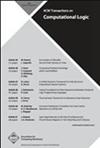Parameterized Complexity of Logic-based Argumentation in Schaefer’s Framework
IF 0.9
4区 数学
Q3 COMPUTER SCIENCE, THEORY & METHODS
引用次数: 1
Abstract
Argumentation is a well-established formalism dealing with conflicting information by generating and comparing arguments. It has been playing a major role in AI for decades. In logic-based argumentation, we explore the internal structure of an argument. Informally, a set of formulas is the support for a given claim if it is consistent, subset-minimal, and implies the claim. In such a case, the pair of the support and the claim together is called an argument. In this article, we study the propositional variants of the following three computational tasks studied in argumentation: ARG (exists a support for a given claim with respect to a given set of formulas), ARG-Check (is a given set a support for a given claim), and ARG-Rel (similarly as ARG plus requiring an additionally given formula to be contained in the support). ARG-Check is complete for the complexity class DP, and the other two problems are known to be complete for the second level of the polynomial hierarchy (Creignou et al. 2014 and Parson et al., 2003) and, accordingly, are highly intractable. Analyzing the reason for this intractability, we perform a two-dimensional classification: First, we consider all possible propositional fragments of the problem within Schaefer’s framework (STOC 1978) and then study different parameterizations for each of the fragments. We identify a list of reasonable structural parameters (size of the claim, support, knowledge base) that are connected to the aforementioned decision problems. Eventually, we thoroughly draw a fine border of parameterized intractability for each of the problems showing where the problems are fixed-parameter tractable and when this exactly stops. Surprisingly, several cases are of very high intractability (para-NP and beyond).Schaefer框架中基于逻辑论证的参数化复杂性
论证是一种公认的形式主义,通过生成和比较论证来处理相互冲突的信息。几十年来,它一直在人工智能领域发挥着重要作用。在基于逻辑的论证中,我们探究论证的内部结构。非正式地说,一组公式是对给定声明的支持,如果它是一致的、子集最小的,并且暗示声明。在这种情况下,支持和主张的结合被称为论据。在这篇文章中,我们研究了在论证中研究的以下三个计算任务的命题变体:ARG(相对于给定的公式集,存在对给定的声明的支持)、ARG-Check(是对给定声明的给定集的支持)和ARG-Rel(类似于ARG-plus,需要在支持中包含额外给定的公式)。ARG检查对于复杂度类DP是完全的,并且已知其他两个问题对于多项式层次的第二级是完全的(Creignou等人,2014和Parson等人,2003),因此是高度棘手的。分析这种棘手的原因,我们进行了二维分类:首先,我们在Schaefer的框架(STOC 1978)中考虑问题的所有可能的命题片段,然后研究每个片段的不同参数化。我们确定了与上述决策问题相关的合理结构参数列表(索赔规模、支持、知识库)。最后,我们为每一个问题彻底地绘制了一个参数化难处理性的精细边界,显示了问题在哪里是固定参数可处理的,以及何时停止。令人惊讶的是,有几个病例的难治性非常高(para-NP及以上)。
本文章由计算机程序翻译,如有差异,请以英文原文为准。
求助全文
约1分钟内获得全文
求助全文
来源期刊

ACM Transactions on Computational Logic
工程技术-计算机:理论方法
CiteScore
2.30
自引率
0.00%
发文量
37
审稿时长
>12 weeks
期刊介绍:
TOCL welcomes submissions related to all aspects of logic as it pertains to topics in computer science. This area has a great tradition in computer science. Several researchers who earned the ACM Turing award have also contributed to this field, namely Edgar Codd (relational database systems), Stephen Cook (complexity of logical theories), Edsger W. Dijkstra, Robert W. Floyd, Tony Hoare, Amir Pnueli, Dana Scott, Edmond M. Clarke, Allen E. Emerson, and Joseph Sifakis (program logics, program derivation and verification, programming languages semantics), Robin Milner (interactive theorem proving, concurrency calculi, and functional programming), and John McCarthy (functional programming and logics in AI).
Logic continues to play an important role in computer science and has permeated several of its areas, including artificial intelligence, computational complexity, database systems, and programming languages.
The Editorial Board of this journal seeks and hopes to attract high-quality submissions in all the above-mentioned areas of computational logic so that TOCL becomes the standard reference in the field.
Both theoretical and applied papers are sought. Submissions showing novel use of logic in computer science are especially welcome.
 求助内容:
求助内容: 应助结果提醒方式:
应助结果提醒方式:


